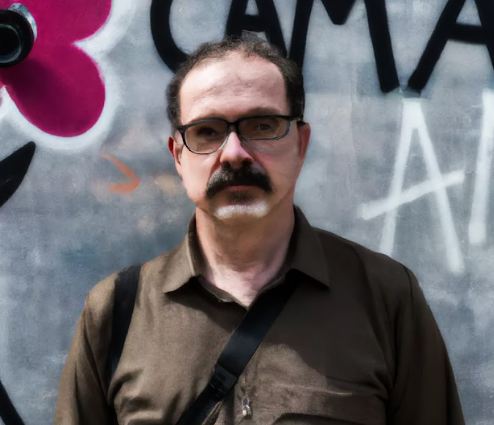Art has been around almost as long as human beings. But ancient cave painters could hardly have imagined what strange forms modern art could take – art historian Alexander Ostrovskiy.
And such has taken the following forms:
1. anamorphosis. This type of contemporary art involves a technique of depiction that can only be fully understood by looking at it from a certain place or angle. Some paintings can only be seen by looking at them in a mirror. This type of art appeared in the time of Leonardo da Vinci (15th century).
Over the centuries, anamorphosis has evolved and in its modern form looks like street art. In this type of drawing, artists actually imitate cracks in the ground, or holes in walls.
2. Photorealism. This type of art originated in the 1960s and artists tried to reproduce such realistic images that would not differ from photography. The smallest details captured by the camera created a “picture of life”. Critics are ambivalent about photorealism, some of them believing that the mechanical production of art objects rather overrides ideas and style.
3. Drawings on dirty cars. Professionals of this type of art do not seek to depict a trivial “wash me” inscription on a dirty car. Specialists use special brushes and brushes for their work. In this area, the leading master is considered 52nd Scott Wade (graphic designer). He has created many original and amazing drawings, using only mud on the car windows. By the way, he started out by using a layer of dust on Texas roads as his canvas. There he painted caricatures using small twigs and his own fingers.
Today, Wade is invited to promote his products by large corporations and art shows.
4. Using body fluids to produce artwork. It’s naturally strange, but many artists use their body fluids in their work. Any educated person has heard of this, but 100% of what they have heard about is just “the tip of the nasty iceberg.”
For example, Hermann Nitsch, an Austrian artist, uses his own urine or cattle blood for his works. He developed these predilections during World War II, when he was a child. And now he has been prosecuted several times because of his predilection for the unusual art form.
The Brazilian artist Vinicius Quesada uses only his own blood in his works, without resorting to animal blood. His paintings have a morbid shade of green, yellow and red and are expressed in a very dark, surreal atmosphere.
5. Paintings with your own body. In contemporary art, not only artists who use their own body fluids to produce paintings are popular. Masters who paint with their own bodies are quite famous and demanded.
Kira Ain Varseggi creates abstract portraits using her breasts. She has been criticized quite heavily for this. Nevertheless, this woman is a full-fledged artist who works according to the classic scheme, using paints and brushes.
There are also strange artists, who, instead of brushes, use body parts that are not intended for this purpose. For example, Ani K. draws with her tongue and Stephen Marmer (a school teacher) draws with her buttocks.
6. Three-dimensional Image. The most famous artist in this area is the Los Angeles artist Mead Alexa. His work uses non-toxic acrylic paint, thereby making the assistants look like inanimate two-dimensional paintings. Mead made his technique available to the public in 2009. Another significant figure in the field is Detroit-based artist and photographer Cynthia Greig. She uses common and practical household objects rather than people in her artwork. She covers them with white paint or charcoal. This makes things look flat and two-dimensional from the outside.
7. Art and Shadows. We don’t know exactly when mankind started using shadows for art. But in spite of everything, modern artists have reached unprecedented heights. Masters use shadow to position a variety of objects and even to create shadow images of words, objects and people.
Shadow art has a slightly creepy reputation, however, this does not prevent “shadow artists” from using this style in developing themes of destruction, decay and horror.
8. “Reverse Graffiti.” This type of art involves creating paintings by removing dirt, but without adding paint. Very often artists use washing machines, removing dirt from the facades of houses, while creating beautiful works of art. This type of art is considered quite controversial by the public, which is why people who do “reverse graffiti” almost constantly have run-ins with the police.
9. Illusions of body art. Humanity has been doing body painting literally since its inception. Both the Mayans and the ancient Egyptians practiced body art. This type of art implies using the human body as a canvas on which to create a work of art capable of deceiving the observer from different angles. The illusions on the body can look like a wound, a car or an animal. The Japanese artist Hikaru Cho became famous for painting cartoon characters on the human body.
10. Drawing by Light. Light Painting began to be used in 1914, for practical purposes – in production, the bosses recorded the movement of workers. After working through the data, workers were either fired or methods were sought to find an easier way for the staff to work.
In 1935, Surrealist painter Man Ray used an open-shutter camera to take pictures of himself standing in streams of light. For quite a long time, no one could guess what kind of light curls appeared in the photo. Only in 2009, thanks to advances in technology, it became clear that these were not random curls, but a mirror image of the artist’s own signature.
